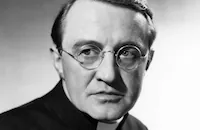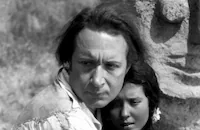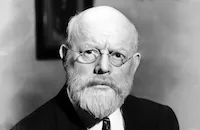Gentleman Jim

Brief Synopsis
Cast & Crew
Raoul Walsh
Errol Flynn
Alexis Smith
Jack Carson
Alan Hale
John Loder
Film Details
Technical Specs

Synopsis
In San Francisco, in 1887, an illegal boxing match is broken up by the police. Among those caught in the raid are two young bank employees, Jim Corbett and Walter Lowrie, and Judge Geary, a member of the bank's board of directors. Upset because boxing's bad reputation has resulted in a ban on the sport, Geary announces that as a member of the Olympic Club, he will arrange for matches involving young men from good families to be held there. The next day, when they see Geary enter the bank, Jim and Walter are convinced they are about to lose their jobs, but Geary is actually there to thank Jim for the story he told in court to explain their presence at the fight. When Victoria Ware, the daughter of Buck Ware, another Olympic Club member, comes to the bank to get a supply of coins for her poker-playing father, Jim insists on accompanying her back to the club. There he talks Vicki into giving him a tour of the club and having lunch with him.
In the gym, Jim does a little boxing and so impresses the trainer that he is proposed for membership. Jim, whose father drives a hackney cab and whose brothers are longshoremen, becomes self-important after his election into the club. The other members, offended by his egotistical behavior, set up a match between Jim and Jack Burke, a former British heavyweight champion. To everyone's surprise, Jim's fancy footwork and quick punches win the match. At the ball afterward, a drunken Walter is asked to leave the club, and out of loyalty, Jim leaves with him. The next morning, Jim and Walter, painfully hungover, wake up in Salt Lake City. To earn the money to return to San Francisco, Jim boxes in a professional match and wins. With the help of manager Delaney, Jim turns professional and continues to win his fights. His successful fight against Joe Choynski takes place on a barge in an attempt to circumvent the laws which prohibit prizefights.
Because of his elegant fighting style, and his penchant for fancy evening clothes, Jim is nicknamed "Gentleman Jim." Now that he is earning a lot of money, Jim moves his family to Nob Hill. Although Jim is attracted to Vicki, she dislikes his airs so much that she is eager to see him fail. In 1892, when Jim needs $10,000 to challenge heavyweight champion John L. Sullivan, Vicki anonymously puts up the money, hoping that Sullivan will knock the pride out of Jim. On the night of the fight, Vicki is in the audience to boo Jim, but he again resorts to his fancy footwork and, at the end of twenty-one rounds, wins the championship. Even Vicki cheers the result, but she makes fun of Jim by buying him a huge hat to fit his swelled head. Sullivan comes to Jim's victory party to present him with his championship belt. They speak graciously of each other, and Jim expresses his deep appreciation of Sullivan's skills and place in history. Vicki is impressed with Jim's sensitivity and confesses that she loves him. When he proposes, she accepts.

Director

Raoul Walsh
Cast

Errol Flynn

Alexis Smith

Jack Carson

Alan Hale

John Loder

William Frawley

Minor Watson

Ward Bond

Madeleine Lebeau

Rhys Williams

Arthur Shields
Dorothy Vaughn

James Flavin
Pat Flaherty
Wallis Clark
Marilyn Phillips
Art Foster
Edwin Stanley
Henry O'hara
Harry Crocker
Frank Mayo
Carl Harbough
Fred Kelsey
Sammy Stein
Jean Del Val

William Davidson

Mike Mazurki
Joe King
Frank Hagney
Wedgwood Nowell
John Maxwell
Syd Saylor
Leo White
Jack Wise
Charles Marsh
Ed "strangler" Lewis
Pat Mckee
Wee Willie Davis
Wade Crosby
Dick Wessel
Emory Parnell
Bud Mccallister
Bert Hanlon
John Merkyl
Johnny Calkins
Charlotte Treadway
Georgia Caine
George Lloyd
Joe Devlin
Wade Boteler
Peggy Diggins
Mary Gordon
Charles Wilson

Emmet Vogan
Jack Gardner
Jack Roper
Davison Clark
Dudley Dickerson
Hal Craig
Robert Fiske
Dan Tobey

Joe Crehan
Lew Harvey
Lester Dorr
Victor Zimmerman
Pat O'malley

Lee Phelps
Pat Moriarty
Si Jenks

Jack Mower

Monte Blue
Richard Kipling
Hooper Atchley
Joan Winfield
Winifred Harris
Charles Lang
De Wolf Hopper
Milt Kibbee

Howard Mitchell
George Sherwood
Larry Mcgrath
Frank Moran
Herbert Heywood
Crew
Milo Anderson
Robert Buckner
Mushy Callahan
Ed Cochrane
Hugh Cummings
Leo F. Forbstein
Ray Heindorf
Sid Hickox
Henry Ivliaigs
Jack Killifer
Vincent Lawrence
James Leicester
Horace Mccoy
C. A. Riggs
H. Roemheld
Russ Saunders
Don Siegel
Ted Smith
Fred Steele
Clarence Steenson
Perc Westmore

Videos
Movie Clip




Trailer
Hosted Intro



Film Details
Technical Specs

Articles
Gentleman Jim
Corbett was the first champion to have won the title fighting under Queensbury rules, and his quiet respectable manner, uncharacteristic around the ring game, earned him his sobriquet. The screenplay, very freely adapted from his autobiography The Roar of the Crowd, opens in San Francisco circa 1887, where the young natty Corbett (Flynn) enjoyed gainful employ as a bank teller. After helping a prominent judge escape unnoticed from his attendance at an illegal bare-knuckle fight, Corbett is suddenly on the fast track at his workplace, and he wangles an invitation to the city's prestigious Olympic Club.
Once inside, Corbett earns a membership on the strength of his boxing skills. It isn't long before the club establishment wants to humble the brash youngster by arranging a fight with a pro. Once Corbett wins the contest by knockout, however, his professional career takes off, culminating in 1892 with his title confrontation against John L. Sullivan (Ward Bond).
Much of the film's substance was made out of whole cloth, with Corbett's 1886 marriage being conveniently shunted aside for a romance with a bank client's beautiful but standoffish daughter (Alexis Smith). Corbett's home life is broadly depicted as a roistering Irish household anchored by ebullient patriarch Alan Hale, sidestepping the murder/suicide that claimed Corbett's parents in real life. If accepted as Hollywood gloss, the film still entertains on the strength of the lead players, as well as those of the supporting cast such as Jack Carson in one of his patented wiseass-best-friend roles, and William Frawley as Corbett's ring man.
Behind the camera for Gentleman Jim was Raoul Walsh, who vividly recounted in his autobiography Each Man in His Time having the opportunity, as a boy, to meet the real Corbett. Walsh's father had taken him to watch a workout for then-current champ Jim Jeffries, and introduced him to Corbett, with whom he was acquainted. "I remember poking around the camp while they talked, inhaling the smells of sweat and leather and embrocation and deciding then and there that I would become a champion boxer," Walsh wrote. "It was just as unimaginable, of course, that one day I would film Corbett's life..."
Flynn was rarely doubled for in the fight sequences, consulting frequently with welterweight champ Mushy Callahan and boxing authority Ed Cochrane in his determination to replicate Corbett's approach in the ring style. Callahan's remembrances were documented in Charles Higham's Errol Flynn: The Untold Story. "Errol tended to use his right fist. I had to teach him to use his left and to move very fast on his feet...Luckily he had excellent footwork, he was dodgy, he could duck faster then anybody I saw. And by the time I was through with him, he'd jab, jab, jab with his left like a veteran."
The famously hard-partying Flynn had been wracked with assorted health problems in 1942, and it all culminated with his collapse during the filming of one of Gentleman Jim's fight sequences. While the studio had publicly chalked it up to fatigue, the doctors diagnosed a mild heart attack. Alexis Smith recounted in the biography, The Two Lives of Errol Flynn by Michael Freedland, how she took the star aside and told him, "'It's so silly, working all day and then playing all night and dissipating yourself. Don't you want to live a long life?' Errol was his usually apparently unconcerned self: 'I'm only interested in this half,' he told her. 'I don't care for the future.'"
Producer: Robert Buckner
Director: Raoul Walsh
Screenplay: James J. Corbett (autobiography), Vincent Lawrence, Horace McCoy
Cinematography: Sidney Hickox
Film Editing: Jack Killifer
Art Direction: Ted Smith
Music: Heinz Roemheld
Cast: Errol Flynn (James J. Corbett), Alexis Smith (Victoria Ware), Jack Carson (Walter Lowrie), Alan Hale (Pat Corbett), John Loder (Carlton De Witt), William Frawley (Billy Delaney).
BW-104m. Closed captioning.
by Jay S. Steinberg

Gentleman Jim
Quotes
Trivia
Notes
James John Corbett became world heavyweight boxing champion on March 17, 1897 when he knocked out John L. Sullivan in twenty-one rounds. He was the first successful fighter to use the Marquis of Queensberry rules. Good looks and a scientific method of boxing earned him the nickname "Gentleman Jim." After he quit boxing in 1903, Corbett starred in several plays, including Gentleman Jack and The Naval Lieutenant, and movies (see index to AFI Catalog of Feature Films, 1911-20). In 1886 Corbett married actress Olive Lake, and after their divorce, he married Jessie Taylor of Omaha. He died on February 18, 1933. Several reviews note discrepancies between the film Gentleman Jim and the actual events of Corbett's life. The Variety review states:"...the heavyweight champ was a self-effacing, quiet personality so distinctly apart from the general run of mugg fighters of that day that the 'gentleman' tag was a natural....[He] was a revered member of the Olympic club to the very end.... Corbett fought most of his battles bareknuckle...and he first met Sullivan in a friendly sparring match at the Olympic club some years before their championship battle....Sullivan hated Corbett...[and] never gave Corbett his championship belt-that had been in the hock shops long before their battle...."
A May 31, 1940 Hollywood Reporter news item notes that three major studios were interested in the screen rights to James J. Corbett's autobiography, which was previously serialized in Saturday Evening Post from 11 October-November 25, 1924. Other Hollywood Reporter news items add the following information about the production: Technical advisor Ed Cochrane was the sports editor of the Chicago Herald-American and an authority on James Corbett. Some scenes were filmed on location at the Baldwin Estate in Santa Anita, CA. A press release in the file on the film at the AMPAS Library announces the casting of Phil Silvers, but he does not appear in the film. A New York Times article dated May 31, 1942 identifies Mushy Callahan, former junior welterweight champion, as one of Errol Flynn's trainers. According to information included in the file on the film at the USC Cinema-Television Library, Callahan also doubled for Errol Flynn in some of the shots showing "Corbett's" fancy footwork, although his name never appears in the daily production reports. Other information in the Warner Bros. Collection reveals that Lewis Milestone turned down an offer to direct the film because he did not like the script. Director Raoul Walsh wanted Barry Fitzgerald to play "Corbett's" father and was interested in either Ann Sheridan or Rita Hayworth for the role of "Vicki." Actors Mike Mazurki and Ed "Strangler" Lewis had been professional wrestlers. Shortly after the film's release, Flynn went on trial for statutory rape. Flynn was acquitted, and the highly publicized case apparently did not adversely affect his career.















